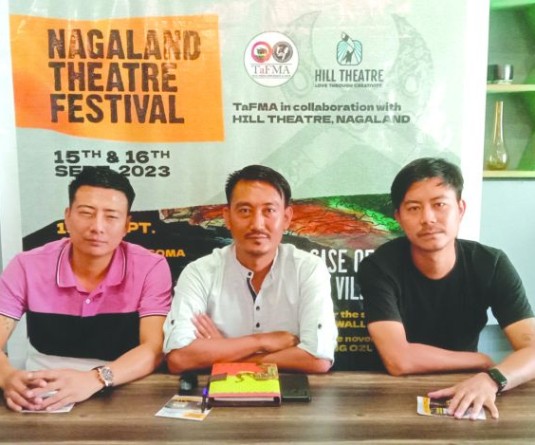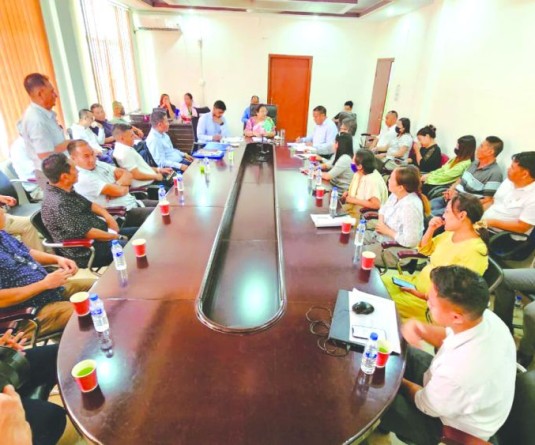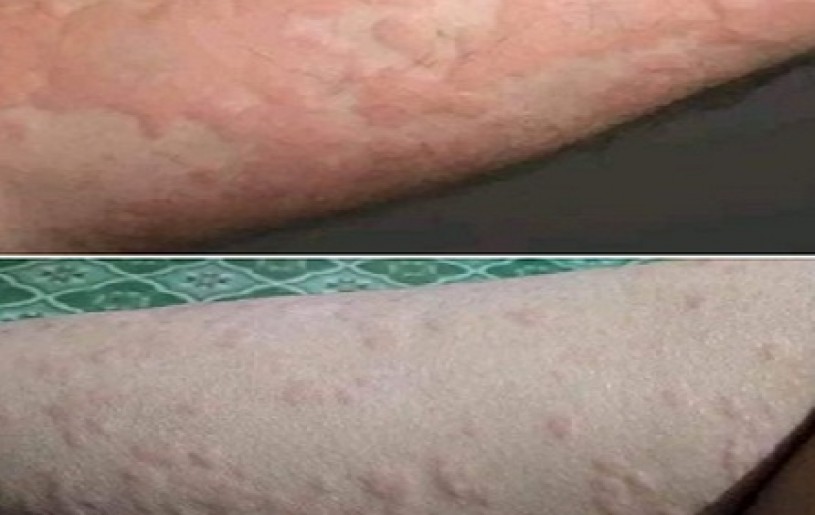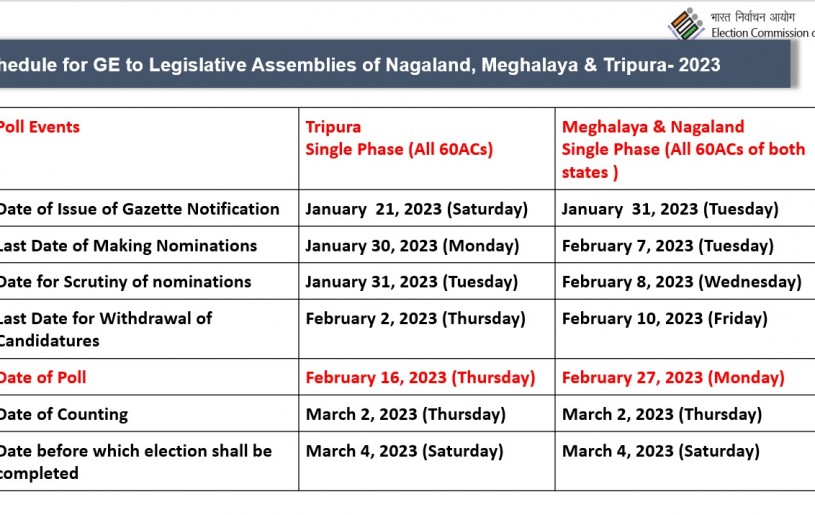Anatu Swu: This man is ‘A Diamond of Dust’
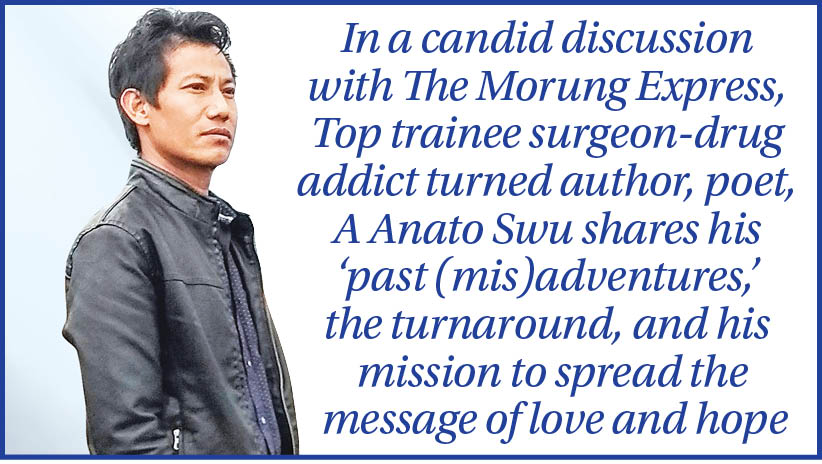
Morung Express News
Dimapur | February 9
“God created me beautiful but I created a skeleton of myself and now I am a useless dust but can sparkle like a diamond provided I allow His Light to work its wonders on me.”
These are the words of a top trainee surgeon, A Anato Swu, who fell into the deep pit of drug abuse and alcoholism while pursuing medical studies, but finally turned into an international writer and a poet.
Anato (46), hailing from Satakha under Zunheboto district, is the fourth eldest son among eight siblings. To pursue the dreams of his father to see him become a doctor, Anato enrolled into the famous Andhra Medical College, Visakhapatnam. After scoring distinction in three subjects in Pre-University (Science), his records surged further during the 1st and 2nd years of his MBBS study, securing distinction in most papers.
However, Anato’s academic records began to slide from 3rd year, though he managed distinction in some papers.
He traced the reason of poor performance to one winter vacation while returning home on a long and tiresome journey by train, which stopped midway at night.
During a candid discussion with The Morung Express, Anato recalled how he coaxed the chemist near the station into giving him an effective pain killer drug which he knew was commonly abused sometimes even resulting in death.
He sought the drug to get some relief from the “absolutely exhausted” body resulting out of the non-stop two-day journey.
Slide into ‘Dust’
With a certain degree apprehension, Anato and a friend popped in the drugs, and shortly found themselves become more talkative, confident and energetic and being transported into a world of euphoria. The next day they bought the same drugs again and continued the train journey as well as the road to addiction.
‘Every time I popped a pill, I told myself, this would be last time but the habit stuck with the word ‘abuse’ having no meaning in his ‘neo-habitual’ dictionary,’ he narrated.
“I thought I could give it up anytime and in truth, I did not have a guilty conscience,” he said adding that the habit lingered for almost 23 years claiming half of his life at 46 now.
During the final year of his MBBS study, Anato was bedridden with feeble health and excruciating pain in his left leg on vacation at home.
Some of the doctors suggested amputation but the seniors, after learning that he was a medical student, did their best to save the leg and eventually carried out skin grafting over the exposed wound.
By the time Anato was discharged from a hospital in Kohima it was already six months and the medical institution in Visakhapatnam did not allow him to continue the studies owing to overstaying holiday.
Repeated requests to the institute and even to the University Vice Chancellor were futile, he added,
Rebuked & forsaken
Meanwhile, for friends and the society, already aware of his addiction and of the incomplete studies, he became a target of rebuke, forsaken by friends and forgotten by society.
Anato recalled that even the Church began to see him as an outcast and out of frustration, disappointment and rejection, he began to see writing as an outlet for all such feelings and experiences.
Most of his poems are based on topics of faith and love which he used to upload on his Facebook page garnering a huge amount of appreciation.
To give up on his drug abuse, Anato said he visited a rehab centre only once which proved futile and the habit continued.
As a medical student, even when none of his veins were no more visible to inject the substance, he would administer the substance himself into different parts of the body since he knew where the veins would be located exactly. That was the extent he abused both drugs and his body.
Anato shared an anecdote, which he describes as a ‘passport embarrassment.’ It happened when he was required to fill out an examination form to be attached with passport size photograph.
When he went to the studio to be photographed, he saw his face in the mirror with prominent cheek bones and eye sockets covered only by skin. There he rolled out two cotton balls and inserted inside of his two cheeks to puff up the face. When it was all done, the photographer smiled but Anato did not smile back since he knew that it was not a normal smile.
“I would often lay awake past midnight, engulfed with anxiety and insecurity. Peace, I had none, and love, I could give to none, as I hardly had any love for myself,” he said, disclosing that he had also attempted suicide multiple times to free himself from the agony.
One day, one of his aunts suggested him to visit a prayer centre where she too received healing without any doctor or medicine.
Anato said he visited the Henivi Prayer Centre in Dimapur more or less as a tourist who was more interested in knowing what the ‘cure without doctors and medicines’ rather than finding any spiritual cure.
At the Centre, Anato and his mother prayed and fasted for more than 30 days at the end of which his limping had diminished and walked almost like a normal person. The prayer warriors had told him that he had be a great blessing in the lives of other people too if he did not stray off the right path and follow God’s commandments.
Anato disclosed that on few occasions after visiting the prayer centre, he had abused drugs but it was the turning point of giving up the habit without any adverse withdrawal symptoms, fortunately.
“My life’s validity had already expired due to drugs and alcohol addiction. However, without my knowledge, it had been recharged with new breadth of life, in the mercy and grace of the Almighty God,” he acknowledged God.
Anato stopped using drugs in 2013 and shifted to alcohol, which was also stopped in 2015.
Polishing the ‘dust'
Meanwhile, somebody far away had already seen Anato in her spiritual vision. He says a certain woman named Mauren Wylie in Ireland searched and contacted him through Facebook and extended assistance to internationally publish his writings. This is when his autobiography, ‘A Diamond of Dust’ was published by Maurice Wylie Media in Northern Ireland.
His book was in huge demand by Oxford University, Cambridge University, National Library of Wales, National Library of Scotland, Royal Library, Dublin and UK based British Library. Wylie, whom Anato fondly referred to as Mama (spiritual mother), even came to Nagaland to take him back to Ireland where he stayed for months visiting various Churches, schools, care groups and International Cross Cultural Event delivering lectures on topics of drug and alcohol abuse.
While in Ireland, Anato was also interviewed by Northern Vision Television in its show, “Our Parlour” along with his publisher, Wylie to relate his life story as a drug addict and how he got into writing.
“Had God not sent Mama, then my rocking boat would have thrown me far out into the seas and I would have drowned in the waters of despair and sorrow,” Anato said.
Soon after, another of his book titled, ‘The Dancing Quill’ which is a collection of poems was published and released. This book was released in last November in Ireland and the Indian edition would be released this month when the publication house Maurice Wylie Media comes to Dimapur to launch its branch.
Unfulfilled desires, helping
If, given a chance by his University in Visakhapatnam, Anato is ready to resume and complete his medical studies to fulfil the desires of his late father, who retired as a Deputy Commandant in the BSF.
For now, his priority is to spread the message of love and hope particularly to the drug users even as he is currently working on to bring out another book on fiction.
In contrast to his suicide attempts as a druggie, Anato’s daily battle now is stay alive to help the people.
Anato’s message to those struggling with drugs: “Being a druggie is what you do, it is not who you are. You never started as a druggie in this life, so you do not have to end it as a druggie.”
He said they (addicts) need not be bothered about other people’s opinion of them but if they honour the covenant and live by its principles then ultimately things will change for the better.
People’s perception will alter and they (addicts) would not have the need to prove anything to anybody, he added.
He says that ‘A Diamond of Dust’ is an expression of his gratitude to the One and only One who was able to bring him out of the pit of abuse.
“If our heart is secure in God, God is at home in our heart and that is the journey we are on ... allowing the diamond to know the God who created it,” said Anato, as a parting message to the readers.


